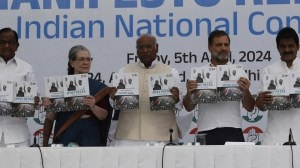- India
- International
How to be a woman, and a sharp cop in India
On the front line, women police officers face crime, patriarchy and the call of duty. How tough is it to have it all?
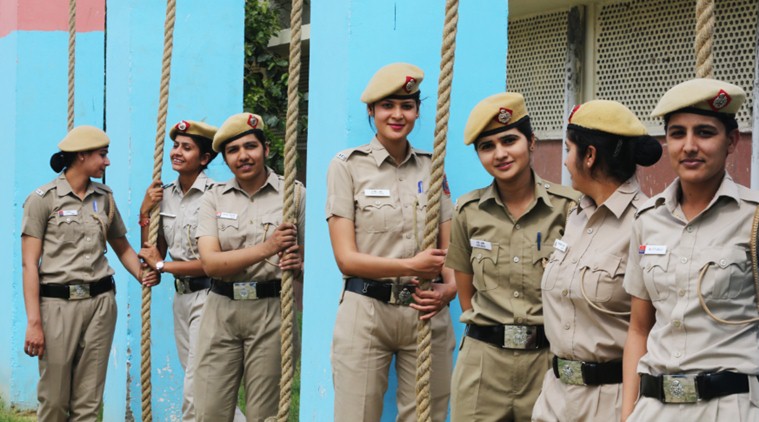 Mind the Gap: Trainee women constables who graduated from the Delhi Police Training College in Dwarka in March. (Photo: Renuka Puri)
Mind the Gap: Trainee women constables who graduated from the Delhi Police Training College in Dwarka in March. (Photo: Renuka Puri)
It was as a Class III student that D Roopa Moudgil first came across the idea of joining the Indian Police Service (IPS). Her teacher had popped the question common to all childhoods — what do you want to be when you grow up? “My mother suggested doctor, but that didn’t appeal to me. Then my father told me about the civil service, through which one could join the Indian Administrative Service and the IPS,” she recalls. “The next day, in class, I said I wanted to join the civil service. Everyone clapped. No one else had mentioned it. I felt it was a unique job,” she says.
In the years that followed, there were other inspirations too — her stint in the National Cadet Corps, listening to a speech by the first Indian woman to become an IPS officer, Kiran Bedi, and the 1989-91 series Udaan on Doordarshan. “I grew extremely fond of the khaki,” she says.
In 2000, she finally cleared the UPSC exam, becoming the first woman IPS officer in Karnataka. It did not take very long for her to realise that the force did not offer a level playing field. “The IPS, unlike other ranks of the police, does not have a quota for women. I trained with the men, and then went on to work with them. Throughout my training, I was told that we are officers first, women later. But the moment I entered the field, I was reminded of my gender,” says Moudgil, now inspector-general of police, railways, Karnataka.
In her nearly two-decade-long career, the officer has been awarded the President’s Police Medal twice. But she has had to deal with doubts of seniors “who would think twice, thrice, multiple times before posting me somewhere”, questions over whether “a woman will be able to deal with an assignment or not”, and apprehensions of politicians “who feel that it is difficult to get work done by a woman.” “They almost always prefer the men,” she says.
At just 7.28 per cent, women officers are a tiny speck in India’s police service. Moudgil’s struggles find an echo in the lives and careers of thousands of such women jostling for space in the male-dominated profession.

In 2014, the Centre had urged all states to provide 33 per cent reservation for women in the police force. But till August last year, Union MoS for Home Hansraj Gangaram Ahir told the Rajya Sabha that only the police forces in eight states — Gujarat, Jharkhand, Madhya Pradesh, Maharashtra, Nagaland, Odisha, Tamil Nadu and Telangana — had implemented it.
Two recent shows on the streaming platform Netflix capture the complexities of policing that Moudgil talks about. Ivan Ayr’s Soni explores the lives of a young policewoman and her superior, and the dilemmas that confront them in a hostile, deeply patriarchal city. In Richie Mehta’s Delhi Crime, deputy commissioner of police Vartika Chaturvedi (Shefali Shah) wages a battle against time and authorities to track down the perpetrators of the 2012 Delhi gang rape, all the while dealing with her rebellious teenage daughter.
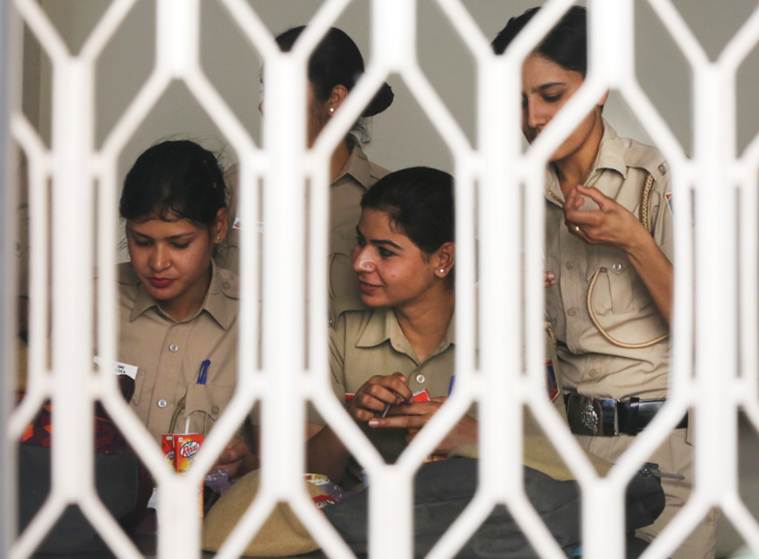 The cops take a snack break at the college. (Photo: Renuka Puri)
The cops take a snack break at the college. (Photo: Renuka Puri)
In a telling scene in Soni, Kalpana (Saloni Batra), whose police chief husband often chides her for being too “soft” on her juniors says, “Why be a cop if you’re not going to act like one?”. The exchange sheds light on the stereotypical masculinity associated with the job, and the onus on women to measure up to it. Kiran Bedi has faced a similar challenge in 1975 when a junior male officer was chosen over her to lead the Republic Day parade that year. “They thought I couldn’t do it because it was a long 14 km march, with a sword in hand, from Vijay Chowk to Red Fort. It was by sheer assertion that I got that job,” says Bedi, who then went on to become the first woman to lead an all-male contingent of Delhi Police at the Republic Day Parade. In her 35-year-old long career, she found “it was not easy for men in uniform to take orders from a woman.” “They test and judge how capable she is. She has to be more efficient than the men to earn their respect,” says Bedi, who is now the Lieutenant Governor of Puducherry.
In a TEDx talk in January last year, Moudgil recalled a 2008 encounter when she was posted as the superintendent of police in Karnataka’s Gadag district. “A powerful politician had given a speech, which had provoked his followers to burn three government buses. I instructed my subordinate to arrest the politician as he was prima facie guilty of abetment of the offence. To my utter shock, not only did my subordinate refuse, but he also kept on arguing …,” she recalled in the address.
But Moudgil didn’t relent. “I kept sitting at the police station through the day. At 10 pm, when the staff saw that I wasn’t budging, they somehow managed to bring the politician to the police station,” she said.
While she dealt with the junior male officer by filing a report against him — he was suspended for nearly a year — what hurt her later was the comment made by the politician after he was released on bail. “He said that I must have acted under the influence of my senior officer, who had problems with him… Even when a woman officer takes tough calls, she will not be given credit for it,” she said in the talk.
Like many professionals, women officers, too, find themselves torn between home and work. “Most women join when they are about to get married, or have children…,” says DCP Suman Nalwa, now principal of the Delhi Police Training School in Dwarka. “A woman constable I knew would wake up at 4 am, cook and clean, and then travel for four hours to reach the police station. She was always sleeping in office. Another assistant sub-inspector would turn up to work with bruises on her face every day. Her husband would beat her up for returning home late. A policewoman’s husband would keep her ATM card, and give her Rs 20 every day as pocket money,” she says.
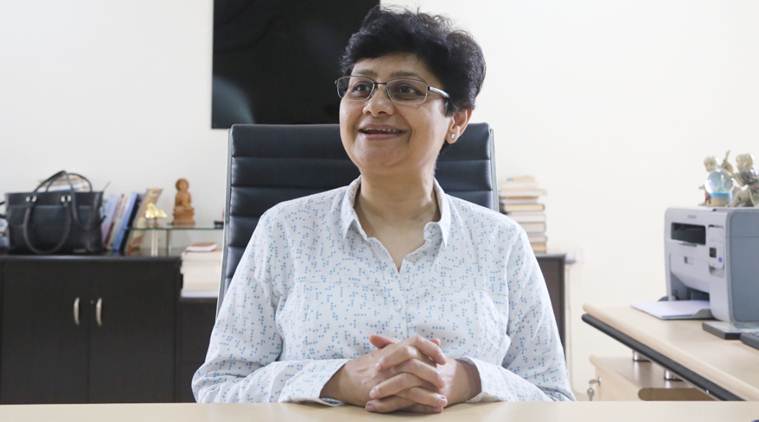 The uphill climb: DCP Sumant Nalwa. (Photo: Renuka Puri)
The uphill climb: DCP Sumant Nalwa. (Photo: Renuka Puri)
The conflict is also why many policewomen, especially in the lower ranks, opt for “loop line” postings, which primarily involve desk work. “‘Focal postings’ involve law and order assignments in the field. But how many women do we see there? In order to make the police force more gender-friendly, we have deployed women at front desks. But what are they doing there? Serving tea and water. This makes them complacent, demotivates them,” says a superintendent of police, who does not wish to be identified.
But many times, even motivation is not enough, as in the case of constable Hemlata, 32, whose desire to take up field assignments coincided with her pregnancy. Right after her daughter was delivered through a C-section, Hemlata was posted to Tihar Jail. “That was when I thought to myself galat job chun li (I chose the wrong job),” she says, sitting in the reception area of Delhi’s Ashok Vihar police station. “Once I had to accompany a convict to Bihar. We were travelling by train. I was pumping out extra milk all the time. I was down with a fever. I was filled with guilt about leaving my daughter behind, but it was also my first big field assignment. I didn’t give up,” she says, adding. “But now that my daughter is 5, I opt for fieldwork often. Both my husband, who is also in the police, and I were part of the January 26 bandobast. My in-laws are supportive and are there for my child. In return, I just have to make a few adjustments. We are girls, we learn to adjust from a young age.”
Dressed in snug khaki trousers and shirt, a slick line of sindoor on her head, she reels out a list of those adjustments. “I have to cover my head at home, wear bangles, change into a sari or suit before reaching home. But see, here at work, I wear a bangle in one hand and a watch in another. It looks smart.”
Vijayanta Arya, DCP of North West district, Delhi, admits that returning to work after a child is one of the biggest challenges for women officers. “Most women in the job are driven to return to work after pregnancy. But either the system or their family fails them. Many families are willing to support their daughters, but what about daughters-in-law?” says the 2009-batch officer.
Apart from her field assignments, Hemlata visits schools and slums as part of Operation Nirbheek, initiated after the 2012 Delhi gang rape to spread awareness among girl students about sexual offences. “It makes my job more fulfilling. Recently, a 12-year-old confessed to us about being abused by a relative. We could save a life,” she says.
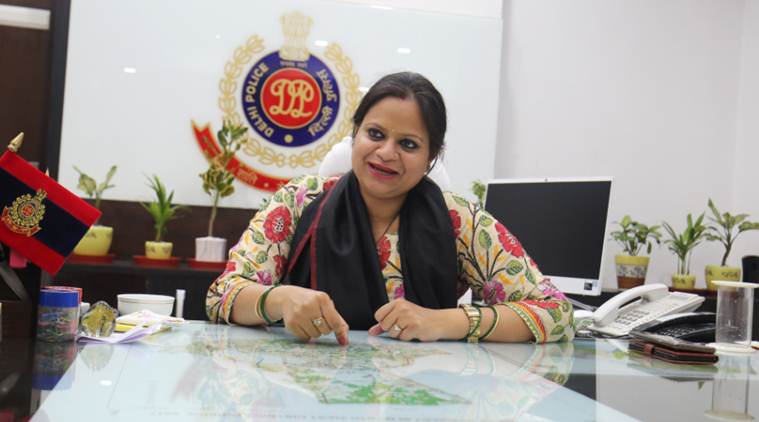 DCP Vijayanta Arya of the Delhi Police. (Photo: Renuka Puri)
DCP Vijayanta Arya of the Delhi Police. (Photo: Renuka Puri)
That policing is not just wielding lathis but work that involves intelligence and people skills is often lost on people, says Rema Rajeshwari, the SP of Mahbubnagar district in Telangana. “We need to ask ourselves why women are not joining the police. Families in Tier-II and -III cities and villages don’t want their daughters to join the force. When we put out advertisements, we fail to convey that policing is not just about hitting people. It’s a nuanced job, and women don’t need to have the stereotypical masculine attributes to fit in,” says Rajeshwari, whose drive to stop the spread of bogus WhatsApp messages in her district made headlines last year.
It is high time more women entered the police force, says Manoj Sinha, the indoor training in-charge at the Dwarka Delhi Police Training School. “As crimes against women increase, especially in cities such as Delhi, you need more women at the front line. They are better at interrogation, at counselling… Victims, especially rape victims, feel safer with women,” says Sinha, who has been with the Delhi Police for 30 years.
Inspector Uma Mehra, who is also a faculty member at the college, and has served in the police force for 31 years, points out that even in field duties, “it’s not about being aggressive all the time”. “Once in Najafgarh, I stopped a bus. Some people came out and started threatening me. I could have lost my cool, but I simply took my phone out and started recording. They got scared, and returned to the bus,” she says.
Most women officers argue that contrary to perception, it is not the people on the field who have “issues” with them. “Whenever I have gone out, people have supported me in my work. It is the system that needs reforms,” says Rajeshwari.
A 2016 study by the Centre for Police Research in Pune, which analysed responses from women across police stations in Maharashtra, revealed that they do not find the police department to be gender-friendly. Meera Borwankar, former commissioner of police, Pune, who had initiated the study, believes a lot more support is needed to make the profession a hospitable place for women. “Especially at the constabulary level, the system needs to back them. Mandatory eight-hour shifts for women, toilets at police stations, changing rooms, leadership training etc. are needed,” she says.
In the opening sequence in Soni, the lead character (Geetika Vidya Ohlyan) is seen cycling home at night, and realises that she is being followed by some men. After ignoring them for a while, Ohlyan beats up one of them. Women officers in the field often find themselves in such situations, and they do not always have the option of taking on the perpetrators physically. “We protect the city but we have to be careful too,” says Hemlata. “While riding home to Dwarka, sometimes even at 1 am, I call up my husband, and keep the phone on speaker through the entire journey,” she says.
Sometime in 2017, around 3 am, while returning from the airport in an autorickshaw after dropping off her teenage daughter, a 45-year-old Delhi Police constable found herself being followed by a group of men in a car. Years of service had made her confident of stepping out at night, but that day she was not in her uniform. “I have been on night patrol several times, handled crowd situations, I have never been scared to step out on my own,” she says.
That night, the men in the car stopped her auto and dragged her to their car. “They tried to rape me… I gave them my jewellery and then begged them to leave me. They stopped, but then tried to choke me. I stopped my breath and pretended to be dead. They then threw me out of the car,” says the constable, who does not wish to be named. But her nightmare did not end there. “When I went to file a complaint, everyone discouraged me. For the first time, I understood what it felt like to be a victim. There were questions raised about my character. Later, an FIR was filed but no action was taken,” says the mother of two.
In February this year, two officers of Kolkata’s all-women mobile police squad, instituted in July 2018 to check crimes against women, were harassed by a group of youths. The officers were in civil clothes. Says additional deputy commissioner of police (cyber crime) Aparajita Rai, “No one in Kolkata has ever attacked a woman in uniform. But officers can’t be in uniform all the time, and that is when they become vulnerable.”
Nevertheless, despite the challenges, women remain dogged about defending the turf they have claimed so far.
In 2017, when Moudgil was deputy inspector-general (prisons), she not only exposed the irregularities inside Bengaluru’s Central Jail, but also took on the political establishment. Transfer orders soon followed, as well as a defamation suit. “There will be times when your colleagues won’t stand by you. You will be seen as a troublemaker. But the only way to survive is by being strong,” she says.
This article originally appeared in print with the headline: How to be a woman, and a sharp cop
Apr 25: Latest News
- 01
- 02
- 03
- 04
- 05


















